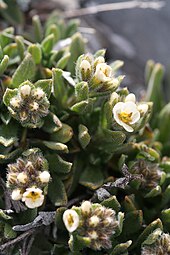Myosotis angustata
| Myosotis angustata | |
|---|---|

| |
| Scientific classification | |
| Kingdom: | Plantae |
| Clade: | Tracheophytes |
| Clade: | Angiosperms |
| Clade: | Eudicots |
| Clade: | Asterids |
| Order: | Boraginales |
| Family: | Boraginaceae |
| Genus: | Myosotis |
| Species: | M. angustata
|
| Binomial name | |
| Myosotis angustata | |
Myosotis angustata is a species of
Description
M. angustata plants are rosettes. The rosette leaves have broad
The calyx is 5–8 mm long at flowering and fruiting, lobed to one-half of its length, and densely covered in straight hairs, as well as some hooked hairs, all of which are antrorse. The corolla is white and about 7 mm in diameter, with a cylindrical tube, and small scales alternating with the petals. The anthers are exserted with the anthers surpassing the faucal scales. The nutlets are 2.2 mm long by 1 mm wide.[3] Flowering and fruiting occur in January.[3][2]
-
Floral detail
-
Partially in bud
-
Growth habit
Taxonomy and etymology
M. angustata Cheeseman is in the plant family Boraginaceae.[4] It was originally described by New Zealand botanist Thomas Cheeseman in his Manual of the New Zealand Flora in 1906.[2] The most recent treatment of this species was done by Lucy B. Moore in the Flora of New Zealand.[3]
The original specimens (syntypes) of this species were collected by Cheeseman in "Mt Arthur Plateau and Raglan Mountains", South Island, New Zealand.[2] The specimens collected by Cheeseman are housed at the herbarium of the Auckland War Memorial Museum (AK).[5][6][7]
Cheeseman noted that M. angustata is morphologically very similar to M. traversii, distinguishing them by M. angustata's narrower leaves and relatively longer anthers, among other differences.[2]
Phylogeny
Two individuals of M. angustata have been included in phylogenetic analyses of standard DNA sequencing markers (nuclear ribosomal DNA and chloroplast DNA regions) of New Zealand Myosotis.[8] Within the southern hemisphere lineage, species relationships, including those of the two individual sequenced of M. angustata, were not well resolved.[8]
Distribution and habitat
M. angustata is a
Conservation status
M. angustata is listed as Threatened – Nationally Critical with the qualifiers Data Poor (DP) and Range Restricted (RR) on the most recent assessment (2017-2018) under the New Zealand Threatened Classification system for plants.[1]
References
- ^ OCLC 1041649797.
- ^ a b c d e Cheeseman, Thomas (1 January 1906). Manual of the New Zealand flora.
- ^ a b c d Moore, L.B. "Boraginaceae. In 'Flora of New Zealand'. (Ed. HH Allan) Vol. 1, pp. 806–833". (Government Printer: Wellington, New Zealand) floraseries.landcareresearch.co.nz. Retrieved 27 April 2022.
- ^ a b "Myosotis angustata". New Zealand Plant Conservation Network. Retrieved 25 July 2023.
- ^ "Myosotis angustata - AK7471". Auckland Museum - Collections Online. Retrieved 26 July 2023.
- ^ "Myosotis angustata - AK210593". Auckland Museum - Collections Online. Retrieved 26 July 2023.
- ^ "Myosotis angustata - AK7472". Auckland Museum - Collections Online. Retrieved 26 July 2023.
- ^ S2CID 254048318.




